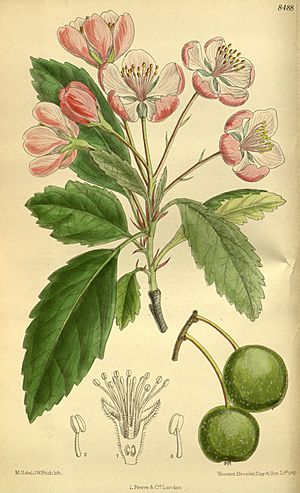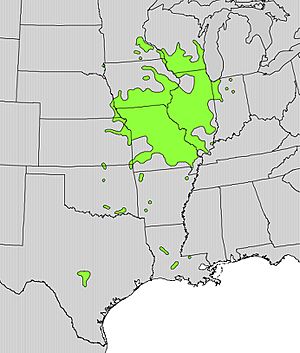Malus ioensis facts for kids
Quick facts for kids Malus ioensis |
|
|---|---|
 |
|
| A drawing of the prairie crabapple from 1913. | |
| Scientific classification |
|
| Kingdom: | Plantae |
| Clade: | Tracheophytes |
| Clade: | Angiosperms |
| Clade: | Eudicots |
| Clade: | Rosids |
| Order: | Rosales |
| Family: | Rosaceae |
| Genus: | Malus |
| Species: |
M. ioensis
|
| Binomial name | |
| Malus ioensis (Alph.Wood) Britton 1897
|
|
 |
|
| Where the prairie crabapple grows naturally. | |
| Script error: The function "autoWithCaption" does not exist. | |
| Synonyms | |
|
|
Script error: No such module "Check for conflicting parameters".
The Malus ioensis, also known as the prairie crabapple, is a type of crabapple tree. It grows naturally in the United States. This tree is known for its pretty flowers and small, apple-like fruits.
Contents
What is a Prairie Crabapple?
The prairie crabapple is a tree that belongs to the rose family. It is a wild relative of the apples we eat. These trees are often found in open areas like prairies. They are an important part of their natural environment.
Where it Grows
The most common kind of prairie crabapple is called Malus ioensis var. ioensis. You can find it mostly in the prairie areas. These are near the upper Mississippi Valley.
Another type is Malus ioensis var. texana. This one is also called the Texas crabapple. It grows only in a small part of central Texas. This shows how different types of the same plant can grow in specific places.
Appearance and Life Cycle
The prairie crabapple tree can grow quite tall. It can reach up to 35 feet (about 10 meters) high. This makes it a medium-sized tree.
Flowers and Fruit
In the summer, the tree gets beautiful white or pink flowers. These flowers are very fragrant. They attract many insects, like bees, which help the tree make seeds.
Later, in the fall, the tree grows small berries. These berries look like tiny apples. They are not usually eaten by people. However, they are a very important food source for many animals.
Importance for Wildlife
Many different kinds of animals eat the fruit of the prairie crabapple. Birds, deer, and other small mammals enjoy these berries. The tree provides food and shelter. This makes it a key part of the local ecosystem.
See also
 In Spanish: Malus ioensis para niños
In Spanish: Malus ioensis para niños
 | Jessica Watkins |
 | Robert Henry Lawrence Jr. |
 | Mae Jemison |
 | Sian Proctor |
 | Guion Bluford |

